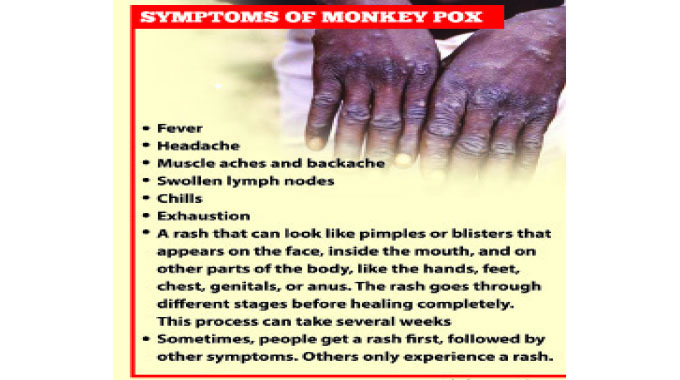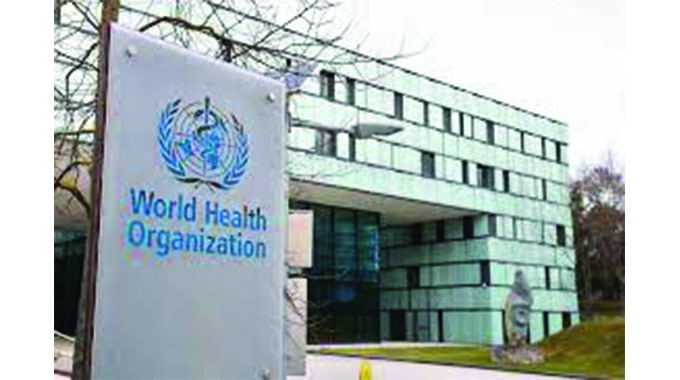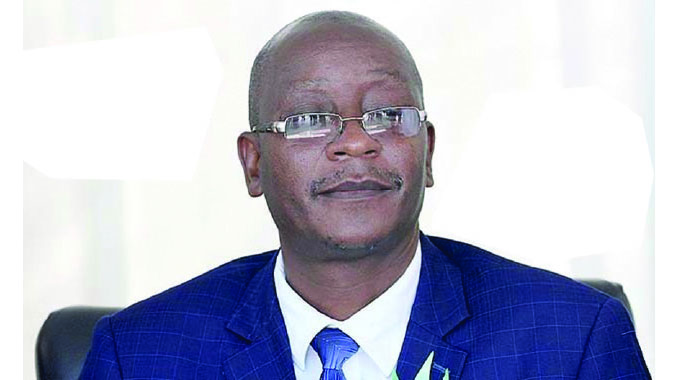High alert as Monkeypox disease detected in South Africa

Lumbidzani Dima, Chronicle Reporter
ZIMBABWEANS have been urged to be vigilant as monkeypox has been detected in the neighbouring South Africa.
Monkeypox is a virus transmitted to humans from animals, with symptoms similar to those seen in the past in smallpox patients although it is clinically less severe.
Monkeypox disease has in the past affected largely West Africa but several western countries started recording cases of the disease at the beginning of this year.
More than 2 000 monkeypox cases have been reported since the start of the year with the United Kingdom having the highest number of 700 cases followed by Spain with more than 500 cases.
Other countries with high monkeypox cases include Germany, Portugal, France, United States of America and Canada.
Egypt is one of the African countries that has recorded cases of monkeypox.
South African Health Minister Dr Joe Phaahla yesterday confirmed the country’s first case saying the patient had no travel history.

South African Health Minister Dr Joe Phaahla
“The patient is a 30-year-old male from Johannesburg who has no travel history, meaning that this cannot be attributed to having been acquired outside South Africa.
Working with the relevant health authorities, a process of contact tracing has begun,” he said.
Minister Phaahla said the National Health Laboratory Services conducted the tests which confirmed the first monkeypox case in the neighbouring country.
Following South Africa’s confirmed case, the Government has urged citizens to exercise more caution due to the country’s proximity to South Africa.
Minister Phaahla said South Africa has ramped up systems to detect the disease through the training of its health workers.
Bulawayo Health Services
Director Dr Edwin Sibanda said Zimbabwe shares a lot in common with South Africa hence the country has to be on alert.
“Obviously we have to be alert because we are in contact with South Africa in more than one way, it can be economically, socially or culturally.
It is therefore essential to be alert and from what we have been told, it is spreading through contact and if it spreads in South Africa, it won’t be surprising if it moves here.
We are on the alert, we will take all the necessary steps when it is detected.
We are preparing for it,” said Dr Sibanda.
Scores of Zimbabweans are based in South Africa and the two countries enjoy good trade relations among other things.
Bulawayo Provincial Medical Director (PMD) Dr Maphios Siamuchembu urged Zimbabweans to be alert considering the country’s proximity to South Africa.

Bulawayo Provincial Medical Director (PMD) Dr Maphios Siamuchembu
He said health workers are already on the lookout for outbreak of monkeypox cases in the country.
“Reporting early to a health facility when one is not feeling well will get the health facilities to detect any new diseases in the country.
To everyone out there, when sick, please report to a health facility as early as possible,” said Dr Siamuchembu.
Recently, the World Health Organization (WHO) warned Zimbabweans against buying second hand clothes saying it could be a potential source of spreading monkeypox.

World Health Organization (WHO)
Meanwhile, WHO yesterday was expected to hold a crunch indaba on whether to declare monkeypox a global health emergency.
Some African scientists have however criticised the move saying this is a discriminatory considering that the disease has been reported in the continent for nearly 22 years.
It was recorded in West African countries such as Nigeria, the Democratic Republic of the Congo, Central African Republic and Ghana.
It is said to be spread through animal to human contacts including contact with rope squirrels, tree squirrels, Gambian rats, dormice, different species of monkeys and others.
The disease can also be transmitted from pregnant women to their children.
WHO reports that the monkeypox symptoms can start being visible after six to 13 days of infection but in some cases it can be detected after 21 days.
Those infected with the disease are supposed to isolate themselves and avoid physical contact with other people.
WHO says the outbreak of monkeypox continues to largely affect men who have sex with other men or those with multiple partners.
Symptoms of monkeypos include rash blisters on face, hands, feet, eyes, mouth, genitals and peri-anal areas.
Victims may also develop fever, swollen lymph nodes, headaches, muscle aches and fatigue.











Comments